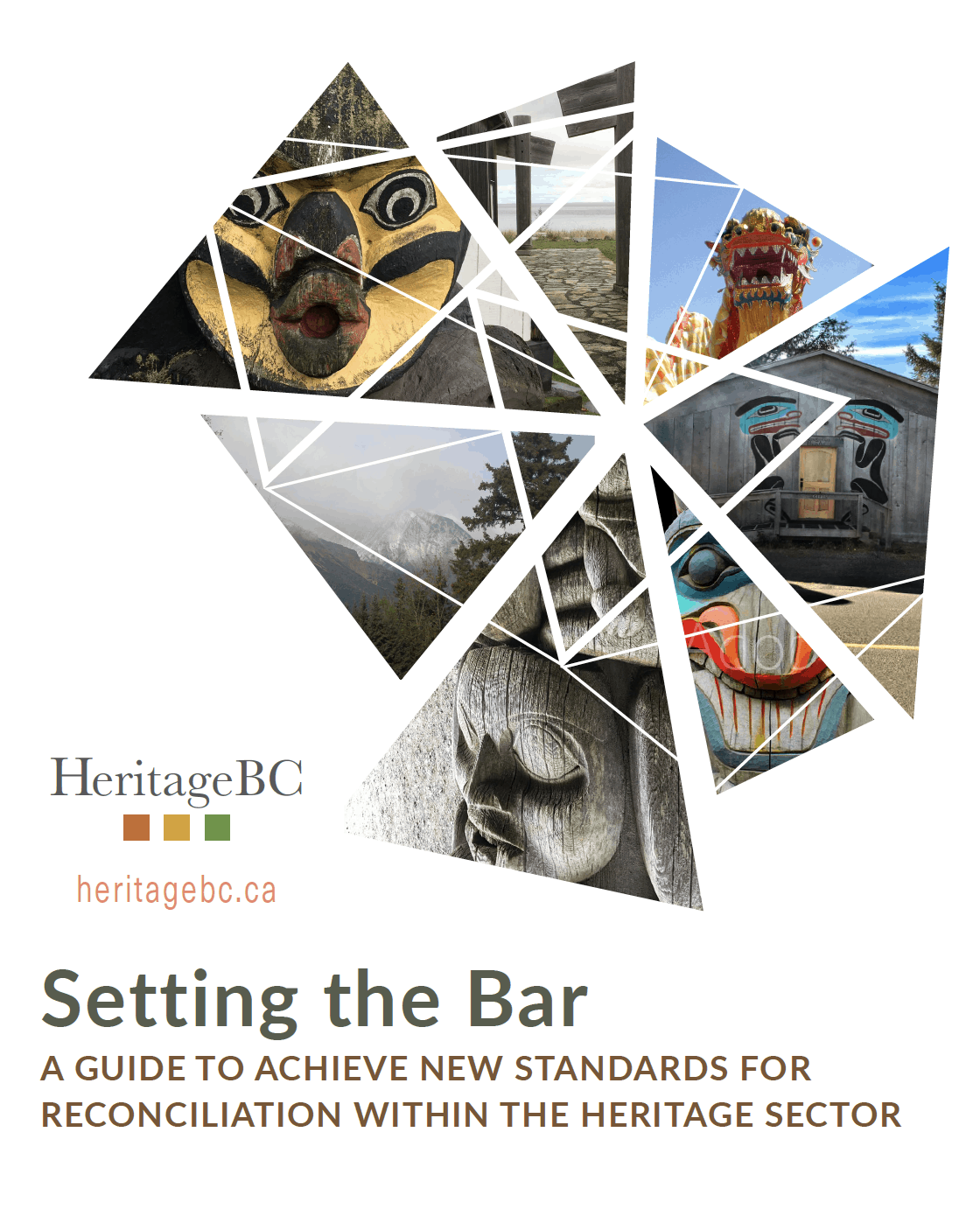- Heritage 101
- Advocacy
- Accessibility for Historic Places
- Climate & Sustainability
- Cultural Maps
- Heritage Place Conservation
- Heritage Policy & Legislation
- Homeowners
- Intangible Cultural Heritage
- Reconciliation
- Indigenous Cultural Heritage
- Setting the Bar: A Reconciliation Guide for Heritage
- 1. Heritage and Reconciliation Pledge
- 2. Acknowledging Land and People
- 3. Celebrating Days of Recognition and Commemoration
- 4. With a Commitment to Learn
- 5. Committing to Strategic Organizational Diversity
- 6. Mission-Making Room for Reconciliation
- 7. Possession, Interpretation, Repatriation and Cultural Care
- 8. Shared Decision Making
- 9. Statements of Significance and other heritage planning documents
- 10. Heritage Conservation Tools, Local Government Act
- Racism: Do Not Let the Forgetting Prevail
- Taking Action: resources for diversity and inclusion
6. Setting the Bar: Mission-Making Room for Reconciliation

ACTION: review your organization’s mission, programs and activities to examine the unintended biases, oversights, and roadblocks.
Download 6. Setting the Bar: Mission-Making Room for Reconciliation
We will illustrate this reconciliation action with a true story about a meeting of museum workers, artists, and business people, who had come together to discuss heritage in their rural community.
As part of the introductory comments, a manager of a small museum described the concisely defined mission: to tell the story of white labourers in a local industry. It happened the meeting and the museum were located on land that is widely celebrated for its deep Indigenous traditions and heritage and so this mission seemed to be unaware of the museum’s context. Yet the group, which included Indigenous people, seemed to understand and respect the chosen direction and nothing was said.
Throughout the day-long meeting, people spoke about the many challenges they face, and much time was given to describing a hopeful future of heritage that will equitably include all people and all stories.
At the close of the meeting, when the attendees summarized the meeting, the museum manager offered the realization that is it possible to honour the museum’s mission while expanding it to include the stories of other settlers and Indigenous people.
It was a significant shift in thinking – transitioning from what is known to what can be. And for any organization, this is an important step toward reconciliation.
Like a lot of other aspects of reconciliation, achievement comes from an openness to different ideas and perspectives and a resolution for self-reflection. The work can be challenging as you look beyond what is familiar and you examine what is comfortable.
This action is not a direction to rewrite your mission statement and we are not suggesting your programming is deficient. This is about contemplation, with clarity and honesty, of your mission and your work in the community.
Do you know why you tell the stories that you do? How were those stories chosen? How were they created and who informed the stories? Have the stories evolved? Do you have permission to tell the stories?
Whose stories are missing and why? Have stories been told from the appropriate perspectives? How does your organization define heritage? Is your mission and work aligned with that definition? Where are the gaps in organizational practice?”
In the context of reconciliation, it is important to understand whose stories are being told and for whom they are told. It is not possible for one organization to tell every story, but it is possible for an organization to tell one story with diversity, respect and integrity.
Tackling these issues can be daunting and time consuming, so it can be helpful break things down into manageable pieces. For example, start analyzing a program/exhibition:
- Why does this program/exhibition exist?
- Whom does it serve? How do we serve this audience? Do we know we meet expectations? Why are people intentionally or unintentionally excluded?
- What needs to change so that the program is more accessible? What are the cost/benefits to make changes?
- If our organization holds reconciliation as a value, how is the programming advancing this value and how it is hindering?
- Does your organization imbed practices/interpretations that contribute to the marginalization (especially unconsciously)?
“Group think” and “confirmation bias” can be problematic when, for example, a group of individuals share similar perspectives and experiences and use these to valid each other’s opinions. It is important to invite differing perspectives and experiences into the conversation. Without judgement, listen, consider the differences, and look for the misunderstandings, misinterpretations and gaps. You might be surprised with what you learn.
This action is about organizational and personal self-examination and tackling change with a commitment to imbed reconciliation into your mission, programs and activities. Keep in mind, this work is ongoing and requires an ongoing commitment.
